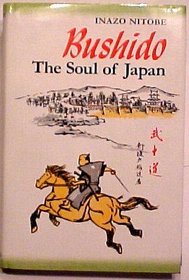It's not often I read non-fiction, and this was undeniably dry; but I'm glad I stuck with it. Being half-Japanese and having studied Japanese language and literature, having lived in Japan and with Japanese people, I've accumulated a slew of images and memories of quirks, anomalies, mannerisms and truisms that are all uniquely Japanese. A Japanese movie or TV show generally brings one or two of those to mind, but reading this Bushido book really gets to the heart of the Japanese matter. I'm su...more It's not often I read non-fiction, and this was undeniably dry; but I'm glad I stuck with it. Being half-Japanese and having studied Japanese language and literature, having lived in Japan and with Japanese people, I've accumulated a slew of images and memories of quirks, anomalies, mannerisms and truisms that are all uniquely Japanese. A Japanese movie or TV show generally brings one or two of those to mind, but reading this Bushido book really gets to the heart of the Japanese matter. I'm surprised how relatable it remains today, 40 years after it was first published.
Not only is it interesting to study the roots of Japanese ethics, feudalism and notions of valor; but this book really made me think about some American things outside my normal sphere of reference - for example life for US military families, how moral relationships like the governing and the governed differ in various countries (or political parties), and also differing cultural views of self-control, respect for enemies, disdain for the intellectual, etc.
Based on names I came across in this book, I have a list of biographies I want to look for now: Sakuma, Saigo, Okubo, Kido, Ito, Okuma, Itagaki.
Not only is it interesting to study the roots of Japanese ethics, feudalism and notions of valor; but this book really made me think about some American things outside my normal sphere of reference - for example life for US military families, how moral relationships like the governing and the governed differ in various countries (or political parties), and also differing cultural views of self-control, respect for enemies, disdain for the intellectual, etc.
Based on names I came across in this book, I have a list of biographies I want to look for now: Sakuma, Saigo, Okubo, Kido, Ito, Okuma, Itagaki.




